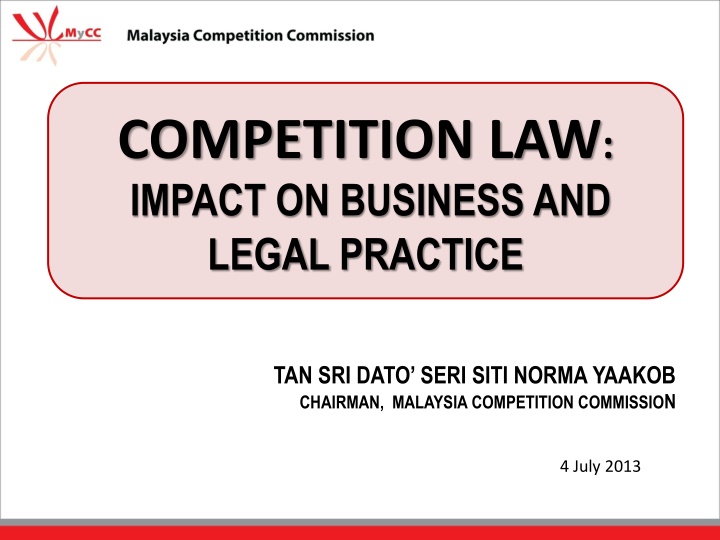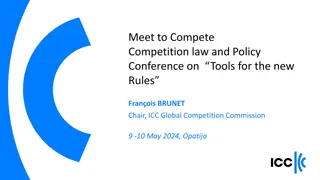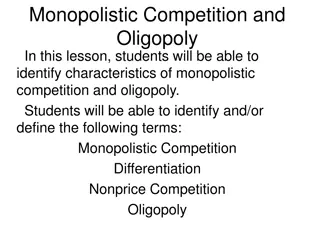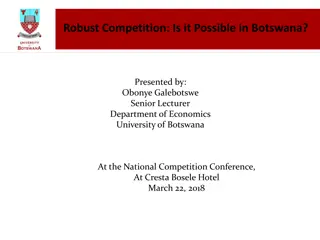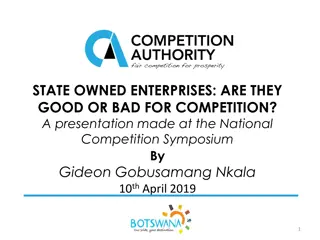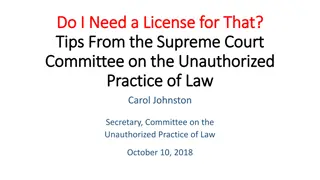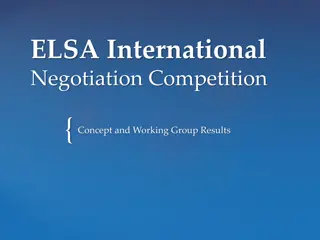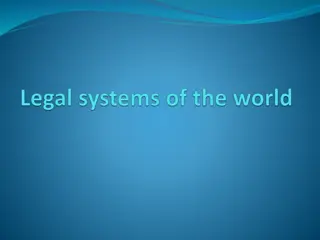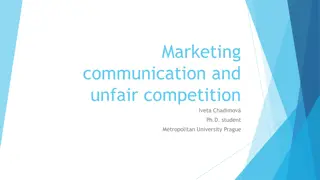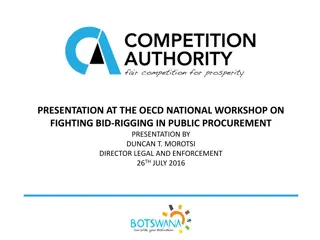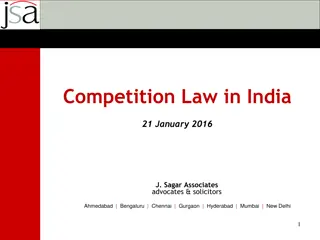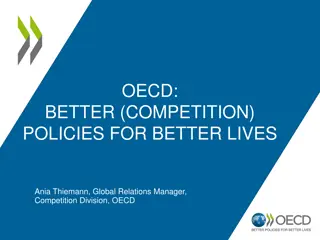Competition Law Impact on Business and Legal Practice
"Exploring the Competition Law framework in Malaysia, including the Competition Commission Act 2010 and its impact on businesses. Learn about the Malaysia Competition Commission's roles in advocacy, investigation, enforcement, and more. Understand the scope of the law, its exclusions, and activities not included. Discover how the law applies to commercial activities within and outside Malaysia, affecting competition in various markets."
Download Presentation

Please find below an Image/Link to download the presentation.
The content on the website is provided AS IS for your information and personal use only. It may not be sold, licensed, or shared on other websites without obtaining consent from the author.If you encounter any issues during the download, it is possible that the publisher has removed the file from their server.
You are allowed to download the files provided on this website for personal or commercial use, subject to the condition that they are used lawfully. All files are the property of their respective owners.
The content on the website is provided AS IS for your information and personal use only. It may not be sold, licensed, or shared on other websites without obtaining consent from the author.
E N D
Presentation Transcript
COMPETITION LAW: IMPACT ON BUSINESS AND LEGAL PRACTICE TAN SRI DATO SERI SITI NORMA YAAKOB CHAIRMAN, MALAYSIA COMPETITION COMMISSION 4 July 2013
COMPETITION COMMISSION ACT 2010 (ACT 713) An Act to provide for the establishment of the Competition Commission, to set out the powers and functions of such Commission, and to provide for matters connected therewith or incidental thereto. Came into force on 1 April 2011 2
MALAYSIA COMPETITION COMMISSION (MyCC) S. 16: An independent body established under the Competition Commission Act 2010 to enforce the Competition Act 2010. Main roles include: Advocacy Investigation & Enforcement Market review Exemption Compliance & Leniency 3
COMPETITION ACT 2010 (ACT 712) An Act to promote economic development by promoting and protecting the process of competition, thereby protecting the interests of consumers and to provide for matters connected therewith Came into force on 1 January 2012 5
SCOPE OF LAW Applies to allcommercialactivities, both within and outside Malaysia which has an effect on competition in any market in Malaysia 6
SCOPE OF LAW (ACTIVITIES NOT INCLUDED) Commercial activity means any activity of commercial nature but does not include:- 1. Any activity, directly or indirectly in the exercise of governmental authority; 2. Any activity conducted based on the principle of solidarity; and 3. Any purchase of goods or services not for the purposes of offering goods and services as part of an economic activity 7
SCOPE OF LAW (EXCLUSION) Commercial activities regulated under: Communications and Multimedia Act 1998 [Act 588] Energy Commission Act 2001 [Act 610] Agreement or conduct that comply with any legislative requirement bargaining activities employment terms & conditions Collective in respect of Services of general economic interest or having the character of a revenue-producing monopoly 8
MAIN PROHIBITIONS ANTI- COMPETITIVE AGREEMENTS ANTI- COMPETITIVE PRACTICES ABUSE OF DOMINANT POSITION 9
Exemptions a) Significant identifiable technological, efficiency or social benefits b) Benefits could not be provided without the anti-competitive agreement c) The detrimental effect of the agreement is proportionate to the benefits d) Competition is not eliminated completely 10
OVERVIEW OF BUSINESSES IN MALAYSIA Public Administration, Support Services and Defence 6% Enterprise means any entity carrying on commercial activities relating to goods and services for the purpose of the Malaysia Competition Act 2010. Others 8% Construction, Mining and Quarrying 9% Agriculture, Forestry and Fishing 3% Professional, Scientific and Technical Activities 9% Accommodation and Food Services 5% Wholesale and Retail Trade, Repair of Motor Vehicle 37% Information and Communication 4% As at 2011, Malaysia has approximately 46,629 companies Manufacturing 8% Real Estate, Financial and Insurance 11% Companies Registered for 2011 According to Business Category based on Malaysia Standard Industrial Classification 2008 (MSIC 2008) 12
IMPLEMENTATION OF THE COMPETITION LAW IN ASEAN COUNTRIES Indonesia Singapore Thailand Vietnam Malaysia Implemented Myanmar Lao PDR Brunei Cambodia Philippines Yet to implement By 2015 13
ANTI-COMPETITIVE AGREEMENTS Section 4 (1) of the Competition Act 2010 A HORIZONTAL or VERTICAL AGREEMENT between ENTERPRISES is prohibited insofar as the agreement has the OBJECT or EFFECT of SIGNIFICANTLY preventing, restricting or distorting competition in any MARKET for goods or services. 14
ANTI-COMPETITIVE AGREEMENTS HORIZONTAL AGREEMENTS Agreement between enterprises each of which operate at the same level in the production or distribution chain PRODUCTION LEVEL DISTRIBUTION CHAIN e.g., between chicken producers e.g., between retailers between sugar manufacturers between wholesalers 15
ANTI-COMPETITIVE AGREEMENTS VERTICAL AGREEMENTS Agreement between enterprises each of which operate at a different level in the production or distribution chain MANUFACTURER VERTICAL AGREEMENT WHOLESALER VERTICAL AGREEMENT RETAILER 16
Price- fixing Limiting or Controlling ANTI- COMPETITIVE AGREEMENTS Market Sharing Bid Rigging Example: The Federal Court ordered Malaysia Airlines Cargo Sdn Bhd to pay A$6 million plus costs for price fixing as part of a cartel following action by the ACCC, bringing the total penalties ordered against the alleged international cartel to A$58 million. (Source: ACCC v Malaysian Airline System Berhad & anor) 17
ABUSE OF DOMINANT POSITION Competition Act 2010, Section 10 An enterprise is prohibited from engaging, whether independently or collectively, in any conduct which amounts to an abuse of a dominant position in any market for goods or services. 18
ABUSE OF DOMINANT POSITION Dominant Position A situation in which one or more enterprises possess such significant market power to adjust prices, outputs or trading terms without effective constraint from competitors Note: 60% market share indicative of dominance Example: The European Commission had adopted a Decision stating that Microsoft had infringed Article 82 EC by committing abuses of a dominant position because it had engaged in two kinds of abusive conduct, The European Commission imposed a fine of 497 million on Microsoft, as well as corrective action to be taken within a certain period of time, subject to a complex verification mechanism. (Source: T-201/04 Microsoft v Commission, judgment of 17 September 2007) 19
Unfair purchase or selling prices or unfair trading conditions Limiting or Controlling ABUSE OF DOMINANT POSITION Refusing to supply Predatory behaviour Applying different conditions 20
ABUSE OF DOMINANT POSITION (continued) Reasonable Commercial Justification Conduct defined as ABUSE and prohibited may be allowed if there are reasonable commercial justification or represents a reasonable commercial response to the market entry or market conduct of a competitor. 21
WHAT SHOULD THE LEGAL PROFESSION DO? Enhance knowledge of Competition Act Develop understanding as regards the legal & the economic principles of Competition Law Understand types of agreements that are prohibited Develop knowledge on compliance to adequately advise client 23
Challenges 24
CHALLENGES Developing knowledge & capacity building With globalisation, need to review existing rules & regulations that may have impact on competition process Timely to review its business model Ensure profession remains relevant & effectively compete in global marketplace 25
1 INTRODUCE COMPLIANCE PROGRAMMES Review all existing agreements & practices Ensure all new agreements are negotiated & concluded on terms that comply with Competition Law Ensure robust Competition Law compliance policies are put in place: Training staff on the Dos and Don ts Code of conduct i.e. provide reporting channel from employee to senior management, initiate an incentive scheme to encourage employee compliance 27
2 KNOW THE LAW Educating employees about competition law The rationale of competition law How competitive markets benefit society Which types of conduct that are prohibited How the legal prohibitions apply to the activities of your company Make known the consequences of such conduct to the employee if discovered 28
3 SELF ASSESSMENT Assess the specific commercial activities engaged in by the company with reference to the prohibited conduct Establish periodic competition audit of your company Discuss among the senior management on the course of action (to comply) if the company is found to be in breach of Competition Act 29
BENEFITS OF COMPETITION Increases choice by stimulating a broader range of products & services Ensures value for money by ensuring firms compete on price & quality Stimulates innovation & productivity by motivating firms to create new products & reduce costs in order to win customers Supports economic growth by promoting choice, value, innovation and productivity 30
CONCLUSION Sword & Shield Approach How to make use of competition law as a sword to attack the anti-competitive or potentially anti-competitive practices of your market rivals How to make use of the same law to shield yourself against allegations of anti-competitive behaviour Re educate yourself of your business contracts Agreements and practices & assess their possible or potential anti-competitive effects 31
CRYSTAL CLEAR MESSAGE "Healthy competition is needed to make the economy more efficient and dynamic. For this, the Competition Law will be introduced to provide a regulatory framework against market manipulation and cartel practices that may affect market efficiency " YAB Dato Seri Najib Tun Razak , Prime Minister of Malaysia in tabling the 10th Malaysia Plan 32
